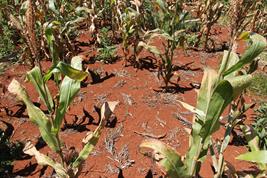21.12.2021

Nutrient deficiencies and acidic soils are major challenges for agriculture in large parts of East Africa. Although the important plant nutrient phosphorus is present in the soil, it is not available to the plants in sufficient quantities. In addition, due to the low pH, increased amounts of aluminum ions are released, displacing important plant nutrients and thus harming the plants. A research project led by ZALF biogeochemist Dr. Jörg Schaller is now working with local partners to investigate how fertilization with local volcanic ash can improve soil fertility in croplands and thus improve crop yields.
Lack of rain, extreme weather and drought events have hit the East African country of Kenya hard in recent years, further exacerbating the population's harvest and crop situation. According to Welthungerhilfe, around 2.1 million people were estimated to be at risk of acute food insecurity in the period from July to October 2021, an increase of 34 percent compared to the previous year. But agriculture is not only suffering from a lack of rainfall. In order to supply plants with sufficient nutrients, farmers in many African countries also have to apply large quantities of expensive fertilizers every year. In order to increase agricultural self-sufficiency and the associated food security, Dr. Schaller's researchers will use a substrate called "tephra". This is obtained from local volcanic ash and is to be used as fertilizer for agricultural land. According to the researchers' hypothesis, silicon present in the ash applied to the soil can mobilize the phosphorus bound to iron in the soil and thus make it available to plants. At the same time, the silicon from the ash is said to reduce the toxic effect of aluminum on the plants, as plants increasingly take up silicon instead of aluminum.
Transferability into smallholder practice
The aim of the project is to analyze the effect of silicon fertilization with tephra on soil pH and aluminum as well as on phosphorus availability for agriculture. In collaboration with local stakeholders as well as scientists in the field from the Jomo Kenyatta University of Agriculture and Technology, the research team aims to identify the key issues that need to be addressed in realizing sustainable use of tephra for the benefit of smallholder farmers in the region.
During a first visit in Kenya, two agricultural areas with the typical soil conditions were selected for field experiment with the help of local farmers. In addition, two tephra deposits located at Lake Baringo and Lake Nakuru were analyzed. Before the field experiment begins in February, these materials will be analyzed in the laboratory for usability and potential for the desired release of elements. At the end of February, before sowing maize, tephra will be incorporated into the soil on a larger scale and according to local cultivation methods.
Project partner:
- Bountifield International Kenya
- Jomo Kenyatta University of Agriculture and Technology
Funding:
The project is funded by the "Seeding the Future Foundation".
 Press Release as PDF
Press Release as PDF
Pictures
For downloading the pictures please click on a picture and use the icon.

